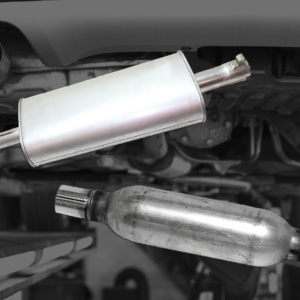Leaded gasoline has been banned since 1996. Instead, vehicle engines are now using unleaded gasoline. Why was this change necessary? Is unleaded gasoline better?
What Is Leaded Gasoline?
Leaded gasoline is regular gasoline with a lead additive that’s meant to raise its octane level and improve performance.
Gasoline engines used to be very inefficient and prone to engine knock during the late 1800s and early 1900s. This damaged engines and caused them to be incredibly loud. In 1921, Thomas Midgley, a chemist working for General Motors, discovered that adding ethanol would increase the octane levels of gasoline and improve engine performance. However, the fuel mixture needed to be 10% ethanol for it to be effective. Unfortunately, adding this amount of ethanol to gasoline was too expensive during this time to be profitable.

In search of cheaper compounds, Midgley discovered that adding tetraethyl lead (TEL) to gasoline would also increase the octane rating. At the time, this seemed like the perfect solution because TEL was cheap and you only needed a very small amount to be effective. However, TEL immediately posed significant health risks as it released lead into the atmosphere as suspended particles. Midgley himself was a victim of lead poisoning during his research, which caused significant migraines. Once leaded gasoline was in production, it immediately caused worker deaths in production plants.
However, the effects of leaded gasoline were largely ignored for decades. Petroleum companies also said that TEL, which was advertised as ethyl, was completely safe.
It took decades for the government to discover and acknowledge the harmful effects of leaded gasoline. The US finally enacted the Clean Air Act in 1996, which banned leaded gasoline for use in vehicles. However, aircraft, race cars, farm equipment, and marine engines were exempt from this.

Where Is Leaded Gasoline Still Used?
Though leaded gasoline has been phased out, it’s still used to fuel aircraft, racing cars, farm equipment, and marine engines. Even if using leaded gasoline may result in health complications, these vehicles don’t support unleaded gasoline.
What Is Unleaded Gasoline?
Unlike leaded gasoline which uses TEL, unleaded gasoline uses ethanol to raise the octane rating of fuel and increase performance and efficiency.
Is Regular Gas Unleaded?
Also known as unleaded gas, regular gas was first introduced in the 1970s after leaded fuel was banned. Since then, it has become the most common type of gas used around the world. Unlike leaded gas, it doesn’t have any lead. It’s a by-product of crude oil, and it usually has an octane level of 87.

Is All Gas Unleaded?
Since leaded gasoline was phased out and banned in 1996, all fuel sold at gas stations across the United States is unleaded. You won’t be able to find leaded gas anymore unless you go out of your way to look for it, and even then, using it would come with serious health risks.
Effects of Leaded Gasoline
Lead is extremely hazardous to human health. Inhaling or ingesting lead-contaminated soil or dust causes lead to enter your bloodstream. Lead poisoning can cause behavioral abnormalities, anemia, and irreversible nerve damage and mental impairment. Long-term exposure can be lethal.
Children are especially susceptible to lead exposure because it can cause learning and behavioral problems. There have even been recent studies showing that half the US population were exposed to high concentrations of lead during early childhood. As a result, Americans who were born during the 1940s onwards have lower IQ scores.
Those born in the 1960s and 1970s, when leaded gas use was at its peak, could have lost six to seven IQ points on average. People born during this time period were exposed to eight times the current health limits for lead.
Luckily, the world has consumed its last leaded fuel reserves for vehicles. However, aviation still contributes 70% of lead emissions in the atmosphere. Luckily, the Federal Aviation Administration is transitioning to lead-free aviation fuel by the end of 2030. The era of toxic leaded fuel usage is fortunately in sight.
What Is Premium Gas?
Today, you’ll typically find three types of gasoline at gas stations, namely regular, midgrade, and premium. Premium gasoline typically has an octane level of around 91 or 93, with the latter sometimes called “super-premium” or “ultra” gasoline.
Here are some of the differences between premium gas and regular gas:
Octane Rating
The octane rating refers to the fuel’s ability to withstand improper combustion. Because premium gas has a higher octane level, it can withstand engine knocking better.
Price
As its name suggests, premium gas is much more expensive than regular gasoline. The exact price can vary depending on your location, but premium gas typically costs around 20 cents more than regular gas per gallon.
Suitability
For peak engine efficiency, some vehicles will exclusively require premium fuel. These vehicles are typically equipped with high-performance engines that need a higher octane level to produce more power.
What Happens When You Use the Wrong Type of Fuel?
Using regular gas on a vehicle that needs premium fuel could lead to a loss of engine power and fuel efficiency. You won’t be making the most of your engine, so it’s best to go with what your manufacturer recommends.
On the other hand, if you end up using premium fuel for an engine that only needs regular gas, you aren’t likely to run into any issues. However, you would be spending more money on gas than necessary.
If you aren’t sure what type of fuel your vehicle needs, you can check your owner’s manual, where manufacturers will often state which fuel type they recommend. They’ll also indicate whether you can try other types or if you have to stick to only one type.
Common Complications
Using the wrong type of fuel leads to many problems. For example, you might experience engine knocking, stalling, more exhaust smoke, and a lit check engine light.
Engine Knocking
Using the wrong type of fuel can cause strange noises to come from the engine. This noise is referred to as engine knocking or engine misfiring.
Engine Stalling
You might also experience problems with the engine suddenly stalling and cutting out mid-drive. This can also be caused by using the wrong type of fuel.
Exhaust Smoke
Using the wrong fuel also increases emissions and produces thick smog. More smoke will come out of the exhaust, making it more harmful for the environment.
Lit Check Engine Light
The check engine light on your dashboard might light up if you use the wrong fuel for your vehicle.
Any information provided on this Website is for informational purposes only and is not intended to replace consultation with a professional mechanic. The accuracy and timeliness of the information may change from the time of publication.




















